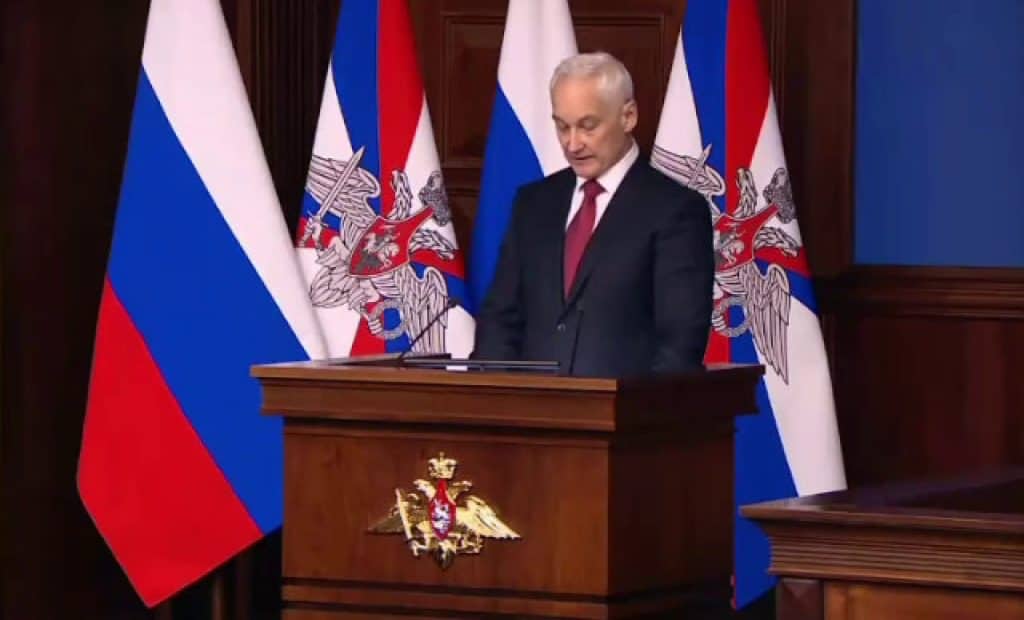
On Monday, Russian Defense Minister Andrei Belousov unveiled plans to form a new military branch focused on unmanned systems. His announcement, which follows a similar Ukrainian move earlier this year, reflects both the critical role drones now play on the battlefield and a desire to institutionalize and systemize Russian evolutions related to these systems.
“In accordance with the instructions of the Supreme Commander-in-Chief, it is proposed to form a new branch” called the Unmanned Systems Forces (USF), Belousov said during the Ministry of Defense’s (MOD) annual end-of-year board session. He added that the USF would be stood up in the third quarter of 2025, pending approval from President Vladimir Putin. The USF’s name suggests it will deal with other types of unmanned systems beyond unmanned aerial vehicles (UAVs), but Belousov did not provide details.
Belousov also didn’t specify where the USF will fit within the Russian military. The Russian Armed Forces include three services (vidy): the Ground Forces, Navy, and Aerospace Forces. They comprise various branches of arms (roda voysk), such as the motor rifle troops under the Ground Forces. There are also two independent branches of arms (roda voysk)—the Airborne Forces and the Strategic Rocket Forces—and, separately, the Special Operations Forces and the Material-Technical Support system. Belousov referred to the USF as a branch of arms (rod voysk) but did not say whether it would be independent. Some Russian experts have suggested it will be independent, like the Ukrainian model.
Exactly when Moscow began mulling the USF’s creation is unclear. The idea has received growing public support among Russian experts in recent months, including in a September 2024 open letter to Belousov allegedly written on behalf of Russian drone specialists and developers. In late November, Putin revealed that the Russian Defense Ministry and General Staff were considering the matter. Putin added that Belousov dealt with drones in his previous position as first deputy prime minister and was “pondering” the question of creating a new branch in collaboration with professional military officers, suggesting the minister may have championed the USF’s creation.
Earlier, the MOD announced that Belousov had personally ordered the establishment of the new “Rubicon” Center of Advanced Unmanned Technologies in August, formed on the basis of an existing drone unit operating in Ukraine. In addition to its combat detachments, the center trains operators and instructors from other units and works on research and development in cooperation with Russian developers, the MOD said. During a visit to Rubicon in October, Belousov ordered it to form five more combat detachments in addition to the two already created.
During the visit, Belousov appeared to hint at the “open” question of whether to form an unmanned systems branch. He also said Russia needs to update its military education and training programs and military occupational specialties to reflect evolutions related to unmanned systems during the full-scale war—a message he repeated during his speech earlier this week. Belousov said Rubicon would serve as a “prototype” to help find an “answer to these questions.” Rubicon may now serve as the foundation for standing up the USF.
The creation of Rubicon and the USF likely reflects Moscow’s efforts to systematize training, force structure, capability development, procurement, and provisioning related to unmanned systems. Volunteer organizations and start-ups, along with ad hoc improvisation by individual units, have played a leading role in these areas (and others) since the full-scale war began. These initiatives have been critical for Russia’s war effort but have also yielded fragmentation and unevenness across units. Official structures have gradually assumed more of a role over time, but significant gaps remain.
Belousov alluded to some of them. His comments correspond with issues recently raised by Russian war correspondents and experts, who argue the USF’s creation will help solve these problems. Reportedly, the Russian military’s official list of specialties still does not reflect many of the drone-related positions that have emerged during the full-scale war. Also, many UAV units and positions created since the war began are not included within their parent unit’s official table of organization and equipment—despite playing a critical role in combat operations. In addition, some commanders reportedly lack a proper understanding of drones and how to employ UAV units, which themselves sometimes are not properly trained and equipped.
One of the consequences, Russian observers say, is that some commanders have been able to reassign personnel from drone units to assault roles with impunity since the drone units don’t officially exist and UAV personnel are technically listed under other specialties. This issue gained widespread attention in September when a pair of well-known drone specialists were killed after an infantry regiment commander allegedly disbanded their drone platoon and sent them on an assault as a form of punishment.
The scandal forced the MOD to announce a formal investigation, which Belousov promised to oversee personally. According to one pro-Kremlin correspondent, the investigation led Belousov to order the General Staff to develop proposals on codifying drone units within maneuver units. A few days later, the widow of one of the drone specialists said she had learned his regiment would indeed get a drone platoon within its official structure.
Moscow is looking to institutionalize and build on the lessons learned and adaptations in Ukraine. If done well, this could help the Russian military. At the same time, a heavy-handed approach could stifle bottom-up innovation and disrupt volunteer units that are working well.
A key question is whom Moscow will tap to lead the new branch. Kyiv did well in selecting a young, innovative commander with a good understanding of unmanned systems. Time will tell whether Russia does the same.







